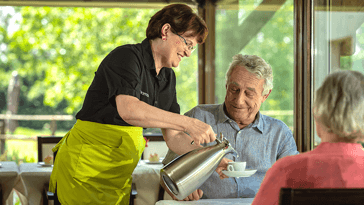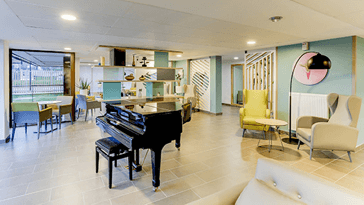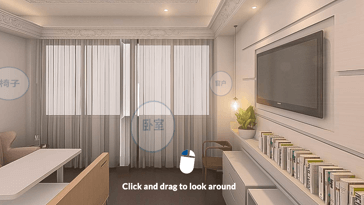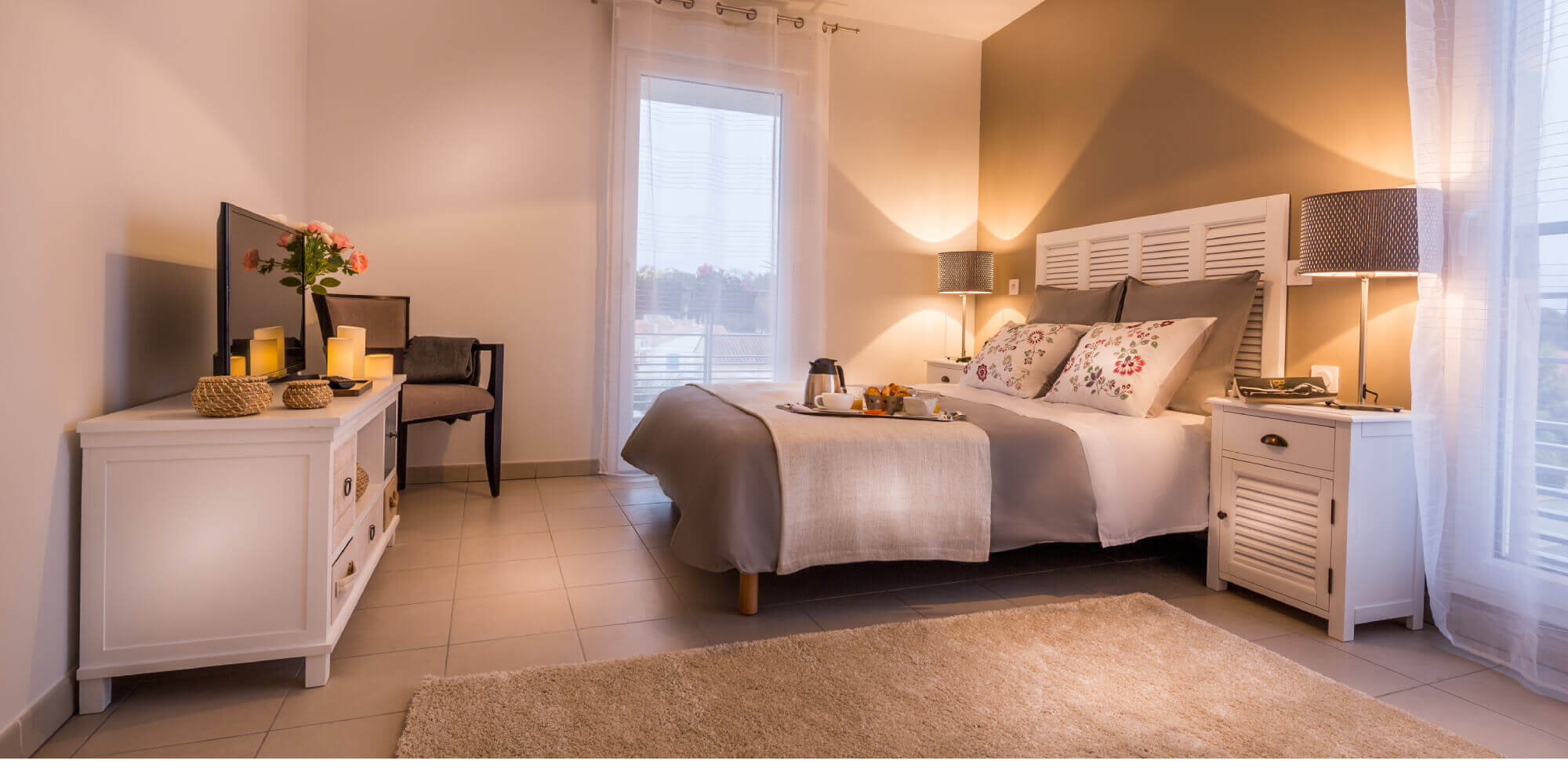Our residences
DomusVi retirement homes are nursing homes that accommodate, for temporary or permanent stays, elderly people who no longer have the physical or mental ability to live at home in safety or wishing to break a fragile isolation.
The project of reception and personalized accompaniment is defined with the future resident and with his relatives in the weeks following his arrival and takes into account his habits of life and all his wishes.
Another home :
« Feeling At home »
Well-being in DomusVi retirement homes is a priority:
- Accommodation and interior design designed for comfort
- The personalization of the room encouraged to recreate a personal atmosphere
- The privacy preserved and the possibility to receive relatives in a private or privatized place
- A well-kept wardrobe
- Fun activities, the same as at home (taichi, television, plants care, dance, movement, physical and gymnastics, knitting, playing cards, calligraphy, reading, etc.)



The Perfect Bedroom

DomusVi has developed an application in VR2 to discover in several dimensions the ideal chamber within the DomusVi’s Nursing Home.
See our domusvi vrQuality at the heart of DomusVi
DomusVi retirement homes are nursing homes that accommodate, for temporary or permanent stays, elderly people who no longer have the physical or mental ability to live at home in safety or wishing to break a fragile isolation.
The Quality and Life and Care departments work daily to improve the quality of our services in a process of continuous improvement. This quality-centric approach is central and takes into account the needs and environment of our 360 ° customers:
Our concept is to create links between the different actors that are residents, families and professionals, in our homes for the elderly. Our residence DomusVi is the new home of the elderly. Our customer feels at home with us.
For the family, entering the retirement home of his parent comes down to a change of address, in a safe place, in a warm atmosphere, with professionals able to take care of his addiction. The family will maintain the same habits of visits, exchanges and relationships as when the parent was at his former place of residence. The place of the family at the heart of Domusvi's main residence is reflected in his moral commitment to assiduously participate in the highlights of the life project and to ensure his regular presence with his parent.
Recognition of the quality of work done on a daily basis leads to professional and individual pride. Human values are at the heart of this concept, they constitute the foundation of each employee who makes his own. The staff meets the residents, from the residence agent to the director, and is aware of his or her participation in the resident's life project. We make sure that daily meetings are an opportunity to express their goodwill.
The DomusVi residence also allows each resident and family to share common moments. The elderly person's former home can sometimes lead to social isolation due to a lack of ability to adapt to movements inside or outside the home: stairs, difficult wheelchair traffic, etc. DomusVi residences are fully adapted for people with reduced mobility and are designed to encourage meetings and social exchanges. Residents, families and professionals meet in these friendly and welcoming spaces.
The Group has created its own quality standards, which go beyond legal standards and obligations.


Places to live, places of life
“Our Nursing Homes are places of life!”
Béatrice Cartier
State-Certified Nurse, Director of Nursing Home, DomusVi France
M.T.
What is precisely a French Nursing Home?
Béatrice Cartier
In France, an Nursing Home is a home for the elderly suffering from a loss of physical and/or mental autonomy, who can no longer or do no longer wish to stay at home. An adapted place where a multidisciplinary health care team – doctors, nurses, caregivers – accompanies them on a daily basis. All the acts of the daily life are guaranteed: care of hygiene, hosting care, food or nursing and medical care. In France, the hospitalization, very disturbing for residents, is only applied as a last step, when specific medical care is necessary for the well-being of the resident or in case of an accident, fall, pathology ...
M.T.
Could you say a few words about DomusVi’s expertise?
Béatrice Cartier
First of all, it is important to insist on the notion of a place of life and an individualized life project. Every resident is different and DomusVi’s concern is to take into account their lifestyle and their needs. Entering a Nursing Home is a difficult and sometimes painful decision, because it marks a break with the life before. It is also, often, blaming family for not being able to accompany a parent. Society is changing and today it is also no longer physically possible. Our Nursing Homes are therefore first places of life. In this way, we recreate places where our residents find their habits and their rhythm of life. We try to recreate a place where they feel almost at home, with an effort on the interior design of the establishment, on furniture and decoration. Our commitment is to welcome the resident – regardless of their level of dependence and needs – to the end of their lives. This is our project in France. This requires that our staff be trained for this and that DomusVi be given considerable autonomy in the management of the establishment. In addition, DomusVi has a real expertise in accompanying senile dementia – including Alzheimer’s – based on more than thirty years of experience. In France, DomusVi has set up facilities for welcoming elderly people with dementia, whose staff are specifically and regularly trained in support.
M.T.
« Like at home », you say. So is it really about recreating a home somewhere else that is totally individualized?
Béatrice Cartier
It’s really an adapted, individualized and evolving life project that involves the whole team, the management of the establishment and the family. This project takes into account the resident’s life story. It will be the basis of the care plan implemented for an optimized and coherent care of which one of the main objectives will be the maintenance of the autonomy of the resident in the respect of his/her person.


